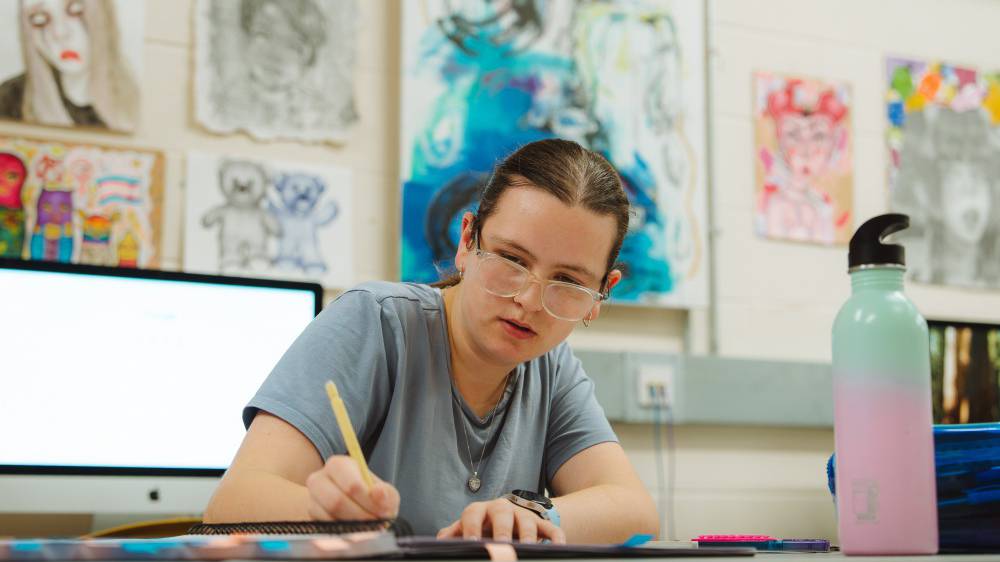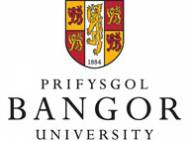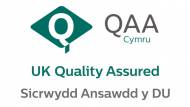Foundation Degree (FdA) Art and Design
Key Details
- Available at:Bangor - Parc Menai (Art and Design)
- Study Mode:Part-time, Full-time
- Course Length:
Full-time: 2 years and part-time: 4 years
Monday, Tuesday & Thursday, 9am - 4pm
- UCAS Codes:WW12
Foundation Degree (FdA) Art and DesignUniversity-level Courses
Part Time
If you are applying to study part-time you can apply directly to the campus of your choice.
Full Time
There are two ways to apply to study for a full-time higher education course - either through UCAS or directly to the college.
Applying through UCAS:
You should apply through UCAS if you are currently studying for A Levels, a vocational Level 3 course (i.e. BTEC) or an Access to Higher Education qualification, or if you wish to apply to more than one higher education provider.
There are two ways to apply to study for a full-time higher education course - either through UCAS or directly to the college.
Course Description
This course is currently under revalidation in consultation with employers and stakeholders, in order to refresh course content for delivery from September 2026.
Do you want a career within the broad disciplines of fine art, applied art and design? Are you an aspiring artist or designer, looking to develop your creative practice?
Whether you are focused on your career or on your passion, this Foundation Degree gives you the ideal opportunity to develop your artistic knowledge, confidence and creativity. You will gain a valuable Higher Education qualification, and will have the option of progressing onto Level 6 to complete an Honours degree.
Modules include:
Year 1 (Level 4)
- Contextualising Art and Design
- Applied Arts
- Graphic Design and Illustration
- Major Project
Level 5 modules (Year 2)
- Contextualising Art and Design
- Developing Practice
- Creative Industry
- Site Context and Practice
- Extending Practice
Additional information
More detailed information on Modules is to be found in the ‘Additional Campus/Course Information’ section.
Entry Criteria
Language requirements:
- GCSE in Welsh or English as first language, grade C/4 or above
- Any degrees, diplomas or certificates eligible should have been taught and assessed in Welsh or English or
- For overseas applicants, for entry onto Level 4, English fluency to IELTS 5.5 or higher (with no element less than 5.0)
- For overseas applicants, for entry onto Levels 5 or above, English fluency to IELTS 6.0 or higher (with no element less than 5.5)
Typical academic requirements:
- A minimum of 64 UCAS tariff points in a main level 3 qualification, usually gaining a pass in one relevant subject which could include: A Levels, BTEC, Foundation Studies, International Baccalaureate, ACCESS to HE; or NVQ Level 3; many additional qualifications from Wales, England and Scotland are accepted to support the UCAS points in addition to the relevant subject, such as the Welsh Baccalaureate.
- GCSE Mathematics/Numeracy, grade C/4 or above, or Key/Essential Skill equivalent level. For applicants without these qualifications, evidence of numeracy skills at a suitable level to meet the demands of the programme successfully, will need to be demonstrated.
Equivalent international qualifications are acceptable.
For individuals who do not meet the above academic requirements, we will consider a wide range of non-standard or professional qualifications and experience, through the submission of a portfolio for accreditation of prior learning (APL/APEL/RPEL), in accordance with GLLM regulations and policies.
All candidates will be interviewed and asked to display a portfolio of work. Overseas applicants will be able to submit an electronic portfolio.
If your qualifications do not meet the entry requirements listed above, we would still encourage you to apply for the course you're interested in, as many of our courses will consider learners based on their previous work and skills experience rather than their qualifications.
Delivery
The course is delivered through a blend of the following:
- Seminars
- Critiques
- Tutorials
- Visiting speakers and lecturers
You will work in purpose-built facilities, supervised by highly qualified tutors, many of whom are practitioners. Throughout the course, your Personal Tutor will review your progress, help plan future assignment choices and discuss your portfolio development.
Students are responsible for organising their own work experience if it is a requirement on their programme, and they will be supported by the course team.
Timetable
- Full-time: 2 years, 3 days per week (typically 9.00 am - 4.00 pm)
- Part-time: 4 years, 1 days per week (typically 9.00 am - 4.00 pm)
Fees
Visit our course fees page for information on full and part-time degree course fees.
Financial Support
Visit our financial support page for information on the range of support available.
Additional costs may be associated with:
- All students are expected to participate in study visits/excursions and should budget approximately £250 for this.
- Annual £30 Studio Fee - contribution towards the cost of essential and bespoke consumables and materials utilised during the studio sessions.
- Art materials required for independent study and practical modules, materials/ equipment lists are given at the beginning of Year 1
- Additional costs that may be needed for exhibition purposes.
- Additional transport costs for Gallery /Exhibition visits
More detailed information on other costs associated with your course and work placements/work experience (if applicable) will be outlined in the programme validation document and explained to you at your interview.
Coleg Cymraeg Cenedlaethol's Incentive Scholarship
Find out more about the Coleg Cymraeg Cenedlaethol's Incentive Scholarship on their website.
For more information on the Coleg Cymraeg Cenedlaethol’s Scholarships, or for assistance in completing the application, please contact Grŵp Llandrillo Menai’s Branch Officers on – colegcymraeg@gllm.ac.uk
Start date
September
As part of the application process, you will be asked to attend an interview to give you the opportunity to discuss the course.
Please bring a sample of your portfolio to the interview. Places on the programme are subject to interview and portfolio.
Contact:
For specific course enquiries, please contact:
Miranda Meilleur (Programme Leader): meille1m@gllm.ac.uk
Sera Williams (Administration): parry3j@gllm.ac.uk
For general enquiries about our degrees, please contact: degrees@gllm.ac.u
Assessment
Assessment takes the form of:
- Portfolio
- Essay
- Blog
- Presentation
- Proposal/idea developments
- Practical outcomes
Feedback
Where relevant, assessments will be marked and returned to students with constructive and developmental feedback. Effective feedback combines information which enables students to understand the strengths and limitations of their past performance, and information which enables them to recognise how future performance can be improved. Students will be provided with feedback in a timely manner and this feedback will justify how the grade has been awarded. Students will have the opportunity to reflect on the feedback given and identify their strengths, things they found challenging and areas for development that they will feed forward to their next assessment. Feedback will include linking evidence to assessment criteria to demonstrate how the student will have met the learning outcomes.
Progression
For students who successfully complete the FdA Foundation Degree, there is an opportunity to apply for, and progress to the final year (level 6) of the BA (Hons) Art and Design and the BA (Hons) Fine Art at Parc Menai. Many students also progress to institutions nationwide to continue their studies at level 5 or level 6, as appropriate.
In terms of creative and professional progression, the course can lead to a variety of routes. Apart from working independently as a designer or artist, there are employment options across the creative industries: for example, in advertising, web design, TV, film, publishing, illustration, contemporary crafts, animation or product design. Other possible career opportunities include education, gallery or museum work, theatre or festival-related work, archive work or work within the print industry.
Campus Information Bangor - Parc Menai (Art and Design)
Course description
The Foundation Degree Art and Design (FdA) is a vocational two-year Higher Education course which offers learners the opportunity to explore a broad range of Art and Design principles and practice through a diverse range of learning experiences including specialist workshops, seminars, tutorials and study trips.
In the second year learners focus on a specialist area from within Graphic Communication, Applied Arts or Fine Art. Learners develop associated skills in their chosen specialist area, building a portfolio of work. The course is run with our partner Bangor University and successful learners graduate with an FdA awarded by Bangor University.
A key feature of the course is the focus on Creative Futures, entrepreneurship and industry placement. This seeks to reinforce theory and practical work within the wider context of creative industries. Industry links are an important part of the course with learners working on live briefs delivered by specialists in a bilingual, creative and supportive environment.
Unit information
Art and Design encompasses a massive range of specialisms ranging from ceramics to web design, for example.
On this course you will study a range of Art and Design applications which will give you practical skills within the broad areas of Visual Communication, Graphic Design, Applied Design and Fine Art. Working with specialist staff within subject areas, students develop a portfolio of work suitable for progression within education or industry.
Year 1 (Level 4)
For every 10 credits, students should engage with around 100 notional hours of learning. This will be approximately 30% direct learning contact 70% independent student learning.
Contextualising Art and Design 1 (20 credits, compulsory)
This module aims to introduce learners to the historical and cultural nature of art and design through lectures, presentations and exhibition visits. (Blog 25%, Presentation 25%, Essay 50%)
Materials & Methods (20 credits, compulsory)
Workshops are provided in Printmaking, Sculpture/3D and Digital/Time-based media which introduce a range of processes, materials and techniques with relevant health and safety instruction. (Portfolio 100%)
Applied Arts (30 credits, compulsory)
This module will enable learners to work with materials, processes and techniques within the Applied Arts specialist areas. (Portfolio 100%)
Graphic Design and Illustration (30 credits, compulsory):
This module introduces learners to key elements within Graphic Design, Illustration and Media. Learners will broaden their appreciation of the diverse working practices in this area, developing appropriate skills and confidence in articulating concepts and ideas relating to a range of briefs. (Portfolio 100%)
Major Project (20 credits, compulsory):
In this module, students consolidate experiences gained so far and identify a specialist area of interest on which to focus, in either Fine Art, Applied Arts or Graphic Design. (Portfolio 100%)
Level 5 modules (Year 2)
Contextualising Art and Design 2 (20 credits, compulsory):
This module builds upon the historical framework explored in contextualising practice at level 4. Contemporary practices of fine art practice are interrogated, debated and displayed. (Portfolio 100%)
Developing Practice (20 credits, compulsory):
In this module, students identify an area for potential development and practical research in subject areas such as Applied Arts, Graphic Design or Fine Art, producing a body of work within that specialism. (Portfolio 100%)
Professional Practice 2 (20 credits, compulsory):
This module will explore the range of possibilities for developing the traditional and digital portfolio as a means of organising, archiving and presenting learners’ work to a specific audience. (Portfolio 100%)
Creative Industry (20 credits, compulsory):
In this module students will respond to a live brief or competition pertinent to their specialism. (Portfolio 100%)
Site Context and Practice (20 credits, compulsory):
Designed to help develop the skills that will equip them for a professional life in work, this module supports students to enlarge upon their knowledge of a professional context for Art & Design practice.(Blog 50%, Portfolio 100%)
Extending Practice (20 credits, compulsory):
This module aims to extend the self-directed nature of students' work. Students cite their work within a specialist area and deepen research and development into materials and associated technical skills that will inform and contribute to the realisation of creative concepts. Students identify themes and concepts within their work and write a proposal for a self-directed body of work. (Portfolio 100%)
Other details
Course type: University-level Courses
Level:
4+5
Programme Area:
- Art and Design and Photography
Awarding Body: Bangor University
Bilingual:
Possible to complete 33% of the course through the medium of Welsh and receive a scholarship from the Coleg Cymraeg Cenedlaethol.
Art and Design and Photography
Learn more about this area and see our course level guide:
Art and Design and Photography

Awarding Body

